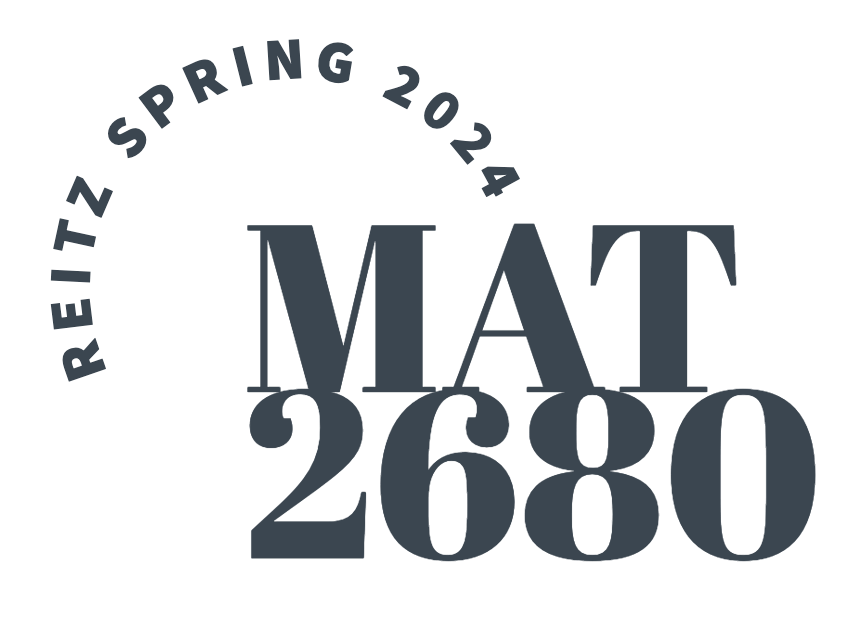Contents
Course Information
Course Number: MAT 2680
Course Title: Differential Equations
Course Outline: Official course outline prepared by the Mathematics Department.
Course Description: Topics include methods of solving ordinary differential equations and applications to various problems.
Credits / Hours: 3
Section Number: D774
Room: N522
Prerequisites: MAT 1575
Textbook: Elementary Differential Equations, Free Edition 1.01, William F. Trench, December 2013. The textbook is available to download for free (pdf) or in softcover format for a small fee. To obtain the textbook click here.
Online Spaces
- OpenLab: This website will be the online home for our class. The site contains important information about the course, and will be used in various ways throughout the semester. Link to this OpenLab site.
- WeBWorK: Much of the homework for this class will be completed through WeBWorK, an online homework system. Link to our WeBWorK section.
Faculty Contact Information
Name: Jonas Reitz
Contact Information
- Email: jreitz@citytech.cuny.edu
- Phone: 718-260-5380
Availability & email response times: I will make an effort to respond to email within 48 hours, often much sooner (but occasionally a little later, when life gets in the way).
Student Hours
Student hours (office hours) (drop-in):
- Mon/Wed 12:45-1:45pm, room N707
- Have a question about what we discussed in class? Stuck on a homework problem? Want to talk about your grade? Drop in!
Learning Outcomes
- Classify differential equations.
- Solve first and second order ordinary differential equations using various techniques.
- Use numerical methods to approximate solutions, when appropriate.
- Apply methods of solving differential equations to answer questions about various systems (such as mechanical or electrical)
Gen Ed Learning Outcomes
Students will be able to:
- Gather, interpret, evaluate, and apply information discerningly from a variety of sources.
- Understand and employ both quantitative and qualitative analysis to solve problems.
- Employ scientific reasoning and logical thinking.
- Communicate effectively.
Schedule
A detailed schedule of topics can be found on the Schedule page.
Grading Policy
Your grade will be based on the following five components.
Homework (25%): Each class you will be assigned problems to complete on the WeBWorK (online homework) system or (in rare cases) written problems from the textbook. Problems will usually be due one week after they are assigned. Over the course of the semester, you will only need to complete 90% of the assigned problems to earn the required points. Any additional points earned will count as bonus credit (50% value of required points).
OpenLab Participation and Discussion (7%): You will be participating on the OpenLab by posting and making comments in response to assigned readings, homework problems, and so on. Your first assignment is to register for the OpenLab and join this class (go to the course website for instructions). Further assignments will be posted on the OpenLab.
Project (8%): The material on numerical approximations of differential equations will include a hands-on project with technological and written elements.
In-Class Exams (35%): There will be 3 exams during the semester (not including the final). No makeup exams will be given. If you miss an exam for a valid reason, your final exam score will take the place of the missing exam.
Final Exam (25%): A final exam is given on the last day of class covering all topics. The final exam must be taken to pass the course.
Percent/Letter Grade conversion
A = 93.0 — 100
A- = 90.0 — 92.9
B+ = 87.0 — 89.9
B = 83.0 — 86.9
B- = 80.0 — 82.9
C+ = 77.0 — 79.9
C = 70.0 — 76.9
D = 60.0 — 69.9
F = 0 — 59.9
Class Etiquette & Netiquette
Whether online or in the classroom, you are expected to behave like a good human. Bullying, talking down to others, and foul language will not be permitted. Be honest, be kind.
Attendance/Participation
Attendance and participation are required in this class! As a student in this class, you are expected to:
- Attend all synchronous class activities.
- Complete all assignments and exams.
- Participate in discussions, whether online or in person.
If you find you are unable to complete any of the above, please let me know *as soon as possible*!
Academic Integrity Policy
Students and all others who work with information, ideas, texts, images, music, inventions and other intellectual property owe their audience and sources accuracy and honesty in using, crediting and citation of sources. As a community of intellectual and professional workers, the college recognizes its responsibility for providing instruction in information literacy and academic integrity, offering models of good practice, and responding vigilantly and appropriately to infractions of academic integrity. Accordingly, academic dishonesty is prohibited in The City University of New York and is punishable by penalties, including failing grades, suspension and expulsion. More information about the College’s policy on Academic Integrity may be found in the College Catalog.
Print this page




Recent Comments